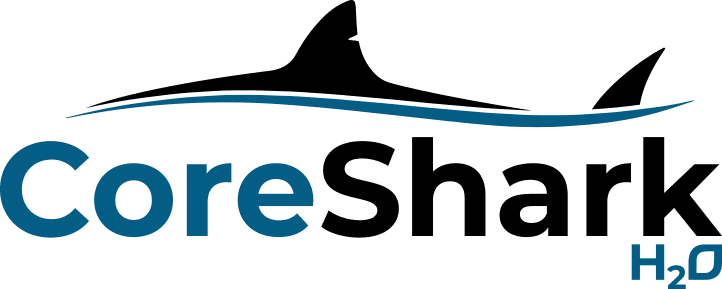Issue 3 | March 2022 | Dear Shark | Nutrient Runoff

Dear Shark,
I have been told that commercial fertilizers and weed killers are bad for the bay, even though I live far from any body of water. Keeping this in mind, are there better ways to grow a healthy lawn without using these products?
Sincerely,
Evergreen Jeanne
Answer provided by Bryan Gomes, ClearShark H2O Education Coordinator
Dear Evergreen Jeanne,
This is a great question and has seasonal relevance as people usually treat their lawns in the fall and spring to make their lawns pretty – which we somehow have come to believe means green and well-manicured. So, what is the issue with commercial fertilizer and why should we limit its use?
First, we have to talk about the two major types of run-off that heavily impact our Chesapeake Bay and surrounding rivers. 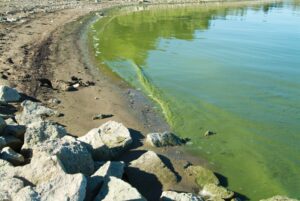 The first is sediment runoff. This is runoff that is created by loose soil, sand, mud, and dirt that peels off the land into our waterways. These sediments not only affect the clarity/turbidity of our waters, it can also have an adverse effect on important filter feeders like oysters that have to work harder to get their food by filtering the silt in addition to their phytoplankton food source!
The first is sediment runoff. This is runoff that is created by loose soil, sand, mud, and dirt that peels off the land into our waterways. These sediments not only affect the clarity/turbidity of our waters, it can also have an adverse effect on important filter feeders like oysters that have to work harder to get their food by filtering the silt in addition to their phytoplankton food source!
The second major runoff type is nutrient runoff. Nutrient runoff is created from nutrients like nitrogen and phosphorus. These are two of the main ingredients in commercially bought fertilizer. The nitrogen in fertilizer is the bigger issue related to runoff in our watershed. Nitrogen stimulates the grass in our yard, but it also stimulates the growth of algae or phytoplankton in our waterways – in both fresh and brackish waters.
It is the excessive growth of algae in our waters that creates large harmful algae blooms; and after the plants die, the decomposition stage lowers the healthy dissolved oxygen levels in the waters. These pockets in the water, commonly known as “dead zones” make it difficult for animals to live in these poor water quality areas.
Nutrient runoff happens in many different land areas around our watershed. 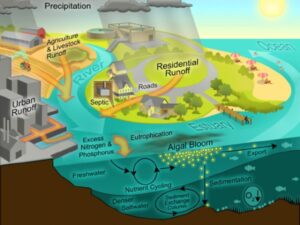 It happens at golf courses and large industrial farms, but it also happens in the yards throughout our communities – which equals or exceeds some large farms and golf courses! We all need to be aware of our personal impact – even if you can’t see a waterway from your property – “we all live downstream” from someone else… Think about it!
It happens at golf courses and large industrial farms, but it also happens in the yards throughout our communities – which equals or exceeds some large farms and golf courses! We all need to be aware of our personal impact – even if you can’t see a waterway from your property – “we all live downstream” from someone else… Think about it!
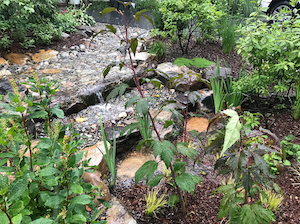 And let’s talk about the ideal suburban yard. In our quest to “keep up with the Joneses”, we are neglecting Mother Nature. Let us strive for less lawn and more yard. Let us strive for less green lawn and more green plants. Adding native plants and rain gardens are a great way to invite more wildlife into your space and help lessen your runoff (of all kinds) wherever it may go.
And let’s talk about the ideal suburban yard. In our quest to “keep up with the Joneses”, we are neglecting Mother Nature. Let us strive for less lawn and more yard. Let us strive for less green lawn and more green plants. Adding native plants and rain gardens are a great way to invite more wildlife into your space and help lessen your runoff (of all kinds) wherever it may go.
So, let’s do our part and make simple trades for commercial fertilizers and weed killers.
Thanks for reading.
Sincerely, Shark
Have a question…we have the answer! Send us an email on it and what you want to know more about?
